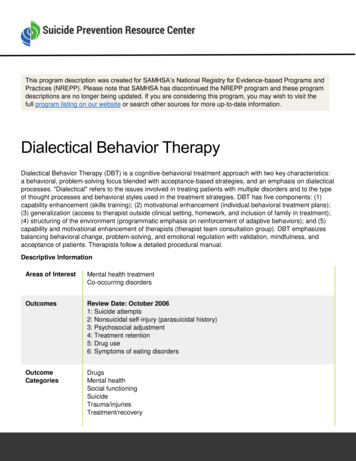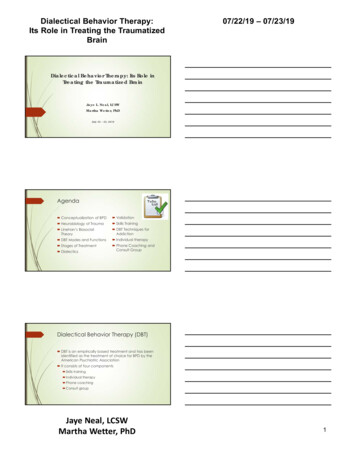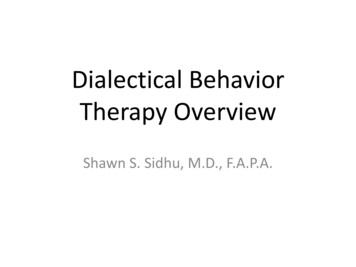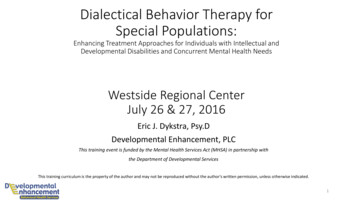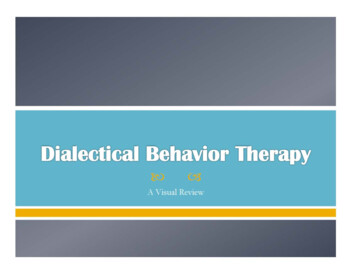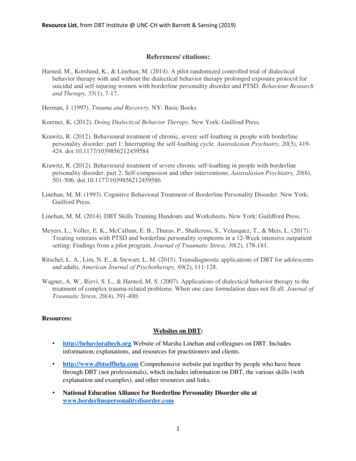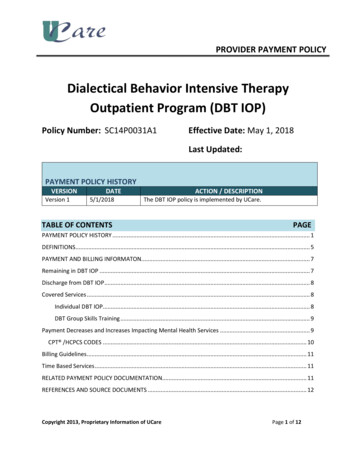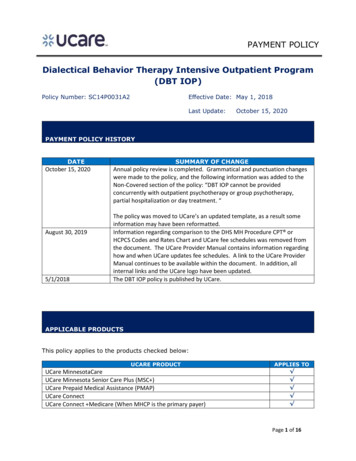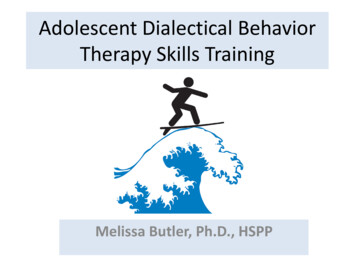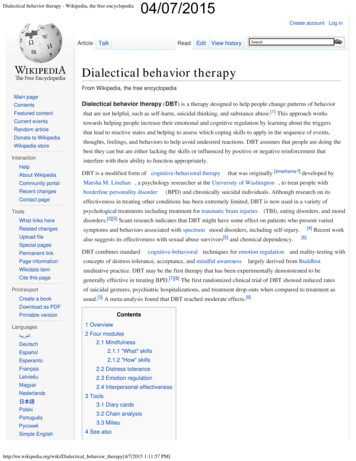
Transcription
Dialectical behavior therapy - Wikipedia, the free encyclopedia04/07/2015Create account Log inArticle TalkGoSearchRead Edit View historySearchDialectical behavior therapyFrom Wikipedia, the free encyclopediaMain pageContentsDialectical behavior therapy (DBT) is a therapy designed to help people change patterns of behaviorFeatured contentthat are not helpful, such as self-harm, suicidal thinking, and substance abuse.[1] This approach worksCurrent eventstowards helping people increase their emotional and cognitive regulation by learning about the triggersRandom articleDonate to WikipediaWikipedia storethat lead to reactive states and helping to assess which coping skills to apply in the sequence of events,thoughts, feelings, and behaviors to help avoid undesired reactions. DBT assumes that people are doing thebest they can but are either lacking the skills or influenced by positive or negative reinforcement thatInteractioninterfere with their ability to function appropriately.Helpthat was originally [timeframe?] developed byAbout WikipediaDBT is a modified form of cognitive-behavioral therapyCommunity portalMarsha M. Linehan , a psychology researcher at the University of Washington , to treat people withRecent changesborderline personality disorderContact pageeffectiveness in treating other conditions has been extremely limited, DBT is now used in a variety ofTools(BPD) and chronically suicidal individuals. Although research on itspsychological treatments including treatment for traumatic brain injuries (TBI), eating disorders, and moodWhat links heredisorders.[2][3] Scant research indicates that DBT might have some effect on patients who present variedRelated changessymptoms and behaviors associated with spectrum mood disorders, including self-injury.Upload filealso suggests its effectiveness with sexual abusesurvivors[5]and chemical dependency.[4]Recent work[6]Special pagesPermanent linkDBT combines standardPage informationconcepts of distress tolerance, acceptance, and mindful awarenessWikidata itemmeditative practice. DBT may be the first therapy that has been experimentally demonstrated to beCite this pagegenerally effective in treating BPD.[7][8] The first randomized clinical trial of DBT showed reduced ratesPrint/exportCreate a bookcognitive-behavioral techniques for emotion regulation and reality-testing withof suicidal gestures, psychiatric hospitalizations, and treatment drop-outs when compared to treatment asusual.[3] A meta-analysis found that DBT reached moderate effects.[9]Download as PDFContentsPrintable versionLanguages العربية Deutsch1 Overview2 Four modules2.1 MindfulnessEspañol2.1.1 "What" skillsEsperanto2.1.2 "How" skillsFrançais2.2 Distress toleranceLatviešu2.3 Emotion sРусскийSimple Englishlargely derived from Buddhist2.4 Interpersonal effectiveness3 Tools3.1 Diary cards3.2 Chain analysis3.3 Milieu4 See alsohttp://en.wikipedia.org/wiki/Dialectical behavior therapy[4/7/2015 1:11:57 PM]
Dialectical behavior therapy - Wikipedia, the free encyclopedia5 NotesSvenska04/07/20156 ReferencesEdit links7 Sources8 Further reading9 External linksOverview[edit]Linehan observed "burn-out" in therapists after coping with "non-motivated" patients who repudiatedcooperation in successful treatment. Her first core insight was to recognize that the chronically suicidalpatients she studied had been raised in profoundly invalidating environments, and, therefore, required aclimate of loving-kindness and somewhat unconditional acceptance (not Rogers ’ positive humanistapproach, but Hanh ’s metaphysically neutral one), in which to develop a successful therapeuticalliance.[note 1] Her second insight involved the need for a commensurate commitment from patients, whoneeded to be willing to accept their dire level of emotional dysfunction.DBT strives to have the patient view the therapist as anally rather than an adversary in the treatment ofpsychological issues. Accordingly, the therapist aims to accept and validate the client’s feelings at anygiven time, while, nonetheless, informing the client that some feelings and behaviors are maladaptive, andshowing them better alternatives.[3]Linehan and others combined a commitment to the core conditions of acceptance and changethrough theHegelian principle of dialectical progress (in which thesis antithesis synthesis) and assembled anarray of skills for emotional self-regulation drawn from Western psychological traditions, such ascognitive behavioral therapy and an interpersonal variant, "assertivenesstraining", and Easternmeditative traditions, such as Buddhist mindfulness meditation. One of her contributions was to alter theadversarial nature of the therapist-client relationship in favor of an alliance based on intersubjectivetough love .All DBT can be said to involve 4 components:Individual - The therapist and patient discuss issues that come up during the week (recorded on diarycards) and follow a treatment target hierarchy. Self-injurious and suicidal behaviors, or lifethreatening behaviors, take first priority. Second in priority are behaviors which, while not directlyharmful to self or others, interfere with the course of treatment. These behaviors are known as therapyinterfering behaviors. Third in priority are quality of life issues and working towards improving one'slife generally. During the individual therapy, the therapist and patient work towards improving skilluse. Often, a skills group is discussed and obstacles to acting skillfully are addressed.Group - A group ordinarily meets once weekly for two to two-and-a-half hours and learns to usespecific skills that are broken down into four skill modules: core mindfulness , interpersonaleffectiveness, emotion regulation, and distress tolerance.Therapist Consultation Team - A therapist consultation team includes all therapists providing DBT.The meeting occurs weekly and serves to support the therapist in providing the treatment.Phone Coaching - Phone coaching is designed to help generalize skills into the patient's daily life.Phone coaching is brief and limited to a focus on skills.Neither component is used by itself; the individual component is considered necessary to keep suicidalurges or uncontrolled emotional issues from disrupting group sessions, while the group sessions teach thehttp://en.wikipedia.org/wiki/Dialectical behavior therapy[4/7/2015 1:11:57 PM]
Dialectical behavior therapy - Wikipedia, the free encyclopedia04/07/2015skills unique to DBT, and also provide practice with regulating emotions and behavior in a social context .Four modules[edit]This article or sectioncontains close paraphrasing of one ormore non-free copyrighted sources. Ideas in this article shouldbe expressed in an original manner. More details may be available onthe talk page . (December 2013)Mindfulness [edit]Further information: mindfulness (psychology)Mindfulness is one of the core concepts behind all elements of DBT. It is considered a foundation for theother skills taught in DBT, because it helps individuals accept and tolerate the powerful emotions theymay feel when challenging their habits or exposing themselves to upsetting situations. The concept ofmindfulness and the meditative exercises used to teach it are derived from traditional Buddhist practice,though the version taught in DBT does not involve any religious or metaphysical concepts. Within DBTit is the capacity to pay attention, nonjudgmentally, to the present moment; about living in the moment,experiencing one's emotions and senses fully, yet with perspective."What" skills [edit]ObserveThis is used to nonjudgmentally observe one’s environment within or outside oneself. It is helpful inunderstanding what is going on in any given situation.DBT recommends developing a "teflon mind," the ability to let feelings and experiences pass withoutsticking in the mind.[10]DescribeThis is used to express what one has observed with the observe skill. It is to be used withoutjudgmental statements. This helps with letting others know what you have observed.ParticipateThis is used to become fully focused on, and involved in, the activity that one is doing."How" skills [edit]NonjudgmentallyThis is the action of describing the facts, and not thinking about what’s “good” or “bad," “fair,” or“unfair.” These are judgments because this is how you feel about the situation but isn’t a factualdescription. Being nonjudgmental helps to get your point across in an effective manner without addinga judgment that someone else might disagree with.One-mindfullyThis is used to focus on one thing. One-mindfully is helpful in keeping your mind from straying intoemotion mind by a lack of focus.EffectivelyThis is simply doing what works. It is a very broad-ranged skill and can be applied to any other skill toaid in being successful with said skill.[11]http://en.wikipedia.org/wiki/Dialectical behavior therapy[4/7/2015 1:11:57 PM]
Dialectical behavior therapy - Wikipedia, the free encyclopedia04/07/2015Distress tolerance [edit]Many current approaches to mental health treatment focus on changing distressing events andcircumstances such as dealing with the death of a loved one, loss of a job, serious illness, terrorist attacksand other traumatic events.[12] They have paid little attention to accepting, finding meaning for, andtolerating distress. This task has generally been tackled by psychodynamic, psychoanalytic, gestalt, ornarrative therapies, along with religious and spiritual communities and leaders. Dialectical behaviortherapy emphasizes learning to bear pain skillfully.Distress tolerance skills constitute a natural development from DBT mindfulness skills. They have to dowith the ability to accept, in a non-evaluative and nonjudgmental fashion, both oneself and the currentsituation. Since this is a non-judgmental stance, this means that it is not one of approval or resignation.The goal is to become capable of calmly recognizing negative situations and their impact, rather thanbecoming overwhelmed or hiding from them. This allows individuals to make wise decisions aboutwhether and how to take action, rather than falling into the intense, desperate, and often destructiveemotional reactions that are part of borderline personality disorder.[11]Distract with ACCEPTSThis is a skill used to distract oneself temporarily from unpleasant emotions.Activities - Use positive activities that you enjoy.Contribute - Help out others or your community.Comparisons - Compare yourself either to people that are less fortunate or to how you used to bewhen you were in a worse state.Emotions (other) - cause yourself to feel something different by provoking your sense of humor orhappiness with corresponding activities.Push away - Put your situation on the back-burner for a while. Put something else temporarily firstin your mind.Thoughts (other) - Force your mind to think about something else.Sensations (other) – Do something that has an intense feeling other than what you are feeling, likea cold shower or a spicy candy.[11]Self-sootheThis is a skill in which one behaves in a comforting, nurturing, kind, and gentle way to oneself. Youuse it by doing something that is soothing to you. It is used in moments of distress or agitation.[11]Chicago Bears wide receiver Brandon Marshall , who was diagnosed with BPD in 2011 and is a strongadvocate for DBT, cited activities such as prayer and listening to jazz music as instrumental in histreatment.IMPROVE the momentThis skill is used in moments of distress to help one relax.Imagery - Imagine relaxing scenes, things going well, or other things that please you.Meaning - Find some purpose or meaning in what you are feeling.Prayer - Either pray to whomever you worship, or, if not religious, chant a personal mantra.Relaxation - Relax your muscles, breathe deeply; use with self-soothing.One thing in the moment - Focus your entire attention on what you are doing right now. Keepyourself in the present.Vacation (brief) - Take a break from it all for a short period of time.http://en.wikipedia.org/wiki/Dialectical behavior therapy[4/7/2015 1:11:57 PM]
Dialectical behavior therapy - Wikipedia, the free encyclopedia04/07/2015Encouragement - Cheerlead yourself. Tell yourself you can make it through this.[11]Pros and consThink about the positive and negative things about not tolerating distress.[11]Radical acceptanceLet go of fighting reality. Accept your situation for what it is.[11]Turning the mindTurn your mind toward an acceptance stance. It should be used with radical acceptance.[11]Willingness vs. willfulnessBe willing and open to do what is effective. Let go of a willful stance which goes against acceptance.Keep your eye on the goal in front of you.[11]Emotion regulation [edit]Further information: emotional self-regulationIndividuals with borderline personality disorder and suicidal individuals are frequently emotionally intenseand labile . They can be angry, intensely frustrated, depressed, or anxious. This suggests that these clientsmight benefit from help in learning to regulate their emotions. Dialectical behavior therapy skills foremotion regulation include:[13][14]Identify and label emotionsIdentify obstacles to changing emotionsReduce vulnerability toemotion mindIncrease positive emotional eventsIncrease mindfulness to current emotionsTake opposite actionApply distress tolerance techniques[11]Story of emotionThis skill is used to understand what kind of emotion one is feeling.1. Prompting event2. Interpretation of the event3. Body sensations4. Body language5. Action urge6. Action7. Emotion name, based on previous items on list[11]PLEASE MASTERThis skill concerns ineffective health habits can make one more vulnerable to emotion mind. This skillis used to maintain a healthy body, so one is more likely to have healthy emotions.Physica L illness (treat) - If you are sick or injured, get proper treatment for it.Eating (balanced) - Make sure you eat a proper healthy diet, and eat in moderation.Avoid mood-altering drugs - Do not take non-prescribed medication or illegal drugs. They are veryharmful to your body, and can make your mood unpredictable.Sleep (balanced) - Do not sleep too much or too little. Eight hours of sleep is recommended perhttp://en.wikipedia.org/wiki/Dialectical behavior therapy[4/7/2015 1:11:57 PM]
Dialectical behavior therapy - Wikipedia, the free encyclopedia04/07/2015night for the average adult.Exercise - Make sure you get an effective amount of exercise, as this will both improve body imageand release endorphins , making you happier.[11]MASTERy (build)Try to do one thing a day to help build competence and control.[11]Opposite actionThis skill is used when you have an unjustified emotion, one that doesn’t belong in the situation athand. You use it by doing the opposite of your urges in the moment. It is a tool to bring you out of anunwanted or unjustified emotion by replacing it with the emotion that is opposite.[11]Problem solvingThis is used to solve a problem when your emotion is justified. It is used in combination with otherskills.[11]Letting go of emotional sufferingObserve and experience your emotion, accept it, then let it go.[11]Interpersonal effectiveness [edit]Interpersonal response patterns taught in DBT skills training are very similar to those taught in manyassertiveness and interpersonal problem-solving classes. They include effective strategies for asking forwhat one needs, saying no, and coping with interpersonal conflict.Individuals with borderline personality disorderfrequently possess good interpersonal skills in a generalsense. The problems arise in the application of these skills to specific situations. An individual may be ableto describe effective behavioral sequences when discussing another person encountering a problematicsituation, but may be completely incapable of generating or carrying out a similar behavioral sequencewhen analyzing his or her own situation.The interpersonal effectiveness module focuses on situations where the objective is to change something(e.g., requesting that someone do something) or to resist changes someone else is trying to make (e.g.,saying no). The skills taught are intended to maximize the chances that a person’s goals in a specificsituation will be met, while at the same time not damaging either the relationship or the person’s selfrespect.DEARMAN - getting somethingThis acronym is used to aid one in getting what he or she wants when asking.Describe your situation.Express why this is an issue and how you feel about it.Assert yourself by asking clearly for what you want.Reinforce your position by offering a positive consequence if you were to get what you want.Mindful of the situation by focusing on what you want and ignore distractions.Appear Confident even if you don’t feel confident.Negotiate with a hesitant person and come to a comfortable compromise on your request.GIVE - giving somethingThis skill set aids one with maintaining his or her relationships, whether they are with friends,coworkers, family, romantic partners, etc. It is to be used in ical behavior therapy[4/7/2015 1:11:57 PM]
Dialectical behavior therapy - Wikipedia, the free encyclopedia04/07/2015Gentle: Use appropriate language, no verbal or physical attacks, no put downs, avoid sarcasmunless you are sure the person is all right with it, and be courteous and non-judgmental.Interested: When the person you are speaking to is talking about something, act interested in whatthey are saying. Maintain eye contact, ask questions, etc. Do not use your cell phone while havinga conversation with another person!Validate: Show that you understand a person’s situation and sympathize with them. Validation canbe shown through words, body language and/or facial expressions.Easy Manner: Be calm and comfortable during conversation, use humor, smile.FAST - keeping self-respectThis is a skill to aid one in maintaining his or her self-respect. It is to be used in combination with theother interpersonal effectiveness skills.Fair: Be fair to both yourself and the other person.Apologies (few): Don’t apologize more than once for what you have done ineffectively, orapologize for something which was not ineffective.Stick to Your Values: Stay true to what you believe in and stand by it. Don’t allow others to getyou to do things against your values.Truthful: Don’t lie. Lying can only pile up and damage relationships and your self-respect.[11]This list does not include the "problem solving" module, the purpose of which is to practice being one'sown therapist.Tools[edit]Diary cards [edit]For more details on this topic, see therapy interfering behavior.Specially formatted cards for tracking therapy interfering behaviors that distract or hinder a patient'sprogress. Diary cards can be filled out daily, 2-3 times a day, or once per week.Chain analysis [edit]Chain analysis is a form offunctional analysis of behavior but with increased focus on sequential eventsthat form the behavior chain. It has strong roots in behavioral psychology in particular applied behavioranalysis concept of chaining.[15]A growing body of research supports the use of behavior chain analysiswith multiple populations.Milieu [edit]The milieu, or the culture of the group involved, plays a key role in the effectiveness of DBT.See also[edit]Acceptance and Commitment TherapyRational emotive behavior therapyNonviolent CommunicationEmotional dysregulationMentalization-based treatmenthttp://en.wikipedia.org/wiki/Dialectical behavior therapy[4/7/2015 1:11:57 PM]
Dialectical behavior therapy - Wikipedia, the free encyclopediaSocial skill04/07/2015Behavioral psychotherapyCognitive Emotional Behaviour TherapyNotes[edit]1. Described by Thich Nhat Hanh in his second moral precept of Zen Buddhism as lovingkindnessReferences.[edit]1. An Overview of Dialectical Behavior Therapy, Psych Central, accessed 01/19/20152. Janowsky, David S. (1999). Psychotherapy indications and outcomes. Washington, DC:American Psychiatric Press. p. 100. ISBN 0-88048-761-5.3. a b c Linehan, M. M. & Dimeff, L. (2001). Dialectical Behavior Therapy in a nutshell, TheCalifornia Psychologist, 34, 10-13.4. Brody, J. E. (2008, May 6). The growing wave of teenage self-harm. New York Times.Retrieved July 1, 2008.5. Decker, S.E.; Naugle, A.E. (2008). "DBT for Sexual Abuse Survivors: Current Status and FutureDirections". Journal of behavior Analysis of Offender and Victim: Treatment and Prevention 1(4): 52–69.6. Linehan, Marsha M.; Schmidt, Henry III; Dimeff, Linda A.; Craft, J. Christopher; Kanter,Jonathan; Comtois, Katherine A. (1999). "Dialectical Behavior Therapy for Patients withBorderline Personality Disorder and Drug-Dependence". The American Journal on Addictions8. pp. 279–292. Retrieved 2014-03-31.7. Linehan, M. M.; Armstrong, H. E.; Suarez, A.; Allmon, D.; Heard, H. L. (1991). "Cognitivebehavioral treatment of chronically parasuicidal borderline patients". Archives of GeneralPsychiatry 48: 1060–64. doi:10.1001/archpsyc.1991.01810360024003.8. Linehan, M. M.; Heard, H. L.; Armstrong, H. E. (1993). "Naturalistic follow-up of a behaviouraltreatment of chronically parasuicidal borderline patients". Archives of General Psychiatry 50 (12):971–974. doi:10.1001/archpsyc.1993.01820240055007. PMID 8250683.9. Kliem, S., Kröger, C. & Kossfelder, J. (2010). (2010). Dialectical behavior therapy for borderlinepersonality disorder: A meta-analysis using mixed-effects modeling. Journal of Consulting andClinical Psychology, 78, 936-951.[1]10. Young, Kathleen (2010-03-11), "Mindfulness and DBT: "What skills" ", Dr. Kathleen Young:Treating Trauma in Tucson11. a b c d e f g h i j k l m n o p q Lisa Dietz (2003). "DBT Skills List" . Retrieved 2010-04-26.12. "Road To Resiliance" Article: What is resilience? American nter/road-resilience.aspx13. Stone, M.H. (1987) In A. Tasman, R. E. Hales, & A. J. Frances (eds.), American PsychiatricPress review of psychiatry (Vol. 8, pp. 103-122). Washington DC: American Psychiatric Press.14. Holmes, P., Georgescu, S. & Liles, W. (2005). Further delineating the applicability ofacceptance and change to private responses: The example of dialectical behavior therapy. TheBehavior Analyst Today, 7(3), 301-311.[2]15. Sampl, S. Wakai, S., Trestman, R. and Keeney, E.M. (2008).Functional Analysis of Behavior inCorrections: Empowering Inmates in Skills Training Groups. Journal of Behavior Analysis ofOffender and Victim: Treatment and Prevention, 1(4), 42-51 BAOhttp://en.wikipedia.org/wiki/Dialectical behavior therapy[4/7/2015 1:11:57 PM]
Dialectical behavior therapy - Wikipedia, the free encyclopediaSources04/07/2015[edit]Linehan,M.M., Heard,H.L. (1993) "Impact of treatment accessibility on clinical course of parasuicidalpatients": Reply. Archives of General-Psychiatry, 50(2): 157-158.Linehan,M.M., Tutek,D.A., Heard,H.L., Armstrong,H.E. (1994). Interpersonal outcome of cognitivebehavioral treatment for chronically suicidal borderline patients. American Journal of Psychiatry, 151,1771-1776.Linehan,M.M., Schmidt,H., Dimeff,L.A., Craft,J.C., Kanter,J., Comtois,K.A. (1999). Dialecticalbehavior therapy for patients with borderline personality disorder and drug-dependence. AmericanJournal on Addiction, 8(4), 279-292.Linehan, M.M., Dimeff, L.A., Reynolds, S.K., Comtois, K.A., Welch, S.S., Heagerty, P., Kivlahan,D.R. (2002). Dialectical behavior therapy versus comprehensive validation plus 12-step for thetreatment of opioid dependent women meeting criteria for borderline personality disorder. Drug andAlcohol Dependence, 67(1), 13-26.Koons, C.R., Robins, C.J., Tweed, J.L., Lynch, T.R., Gonzalez, A.M., Morse, J.Q., Bishop, G.K.,Butterfield, M.I., Bastian, L.A. (2001). Efficacy of dialectical behavior therapy in women veteranswith borderline personality disorder. Behavior Therapy, 32(2), 371-390.van den Bosch, L.M.C., Verheul, R., Schippers, G.M., van den Brink, W. (2002). Dialectical BehaviorTherapy of borderline patients with and without substance use problems: Implementation and longterm effects. Addictive Behaviors, 27(6), 911-923.Verheul, R., van den Bosch, L.M.C., Koeter, M.W.J., de Ridder, M.A.J., Stijnen, T., van den Brink, W.(2003). Dialectical behaviour therapy for women with borderline personality disorder: 12-month,randomised clinical trial in the Netherlands. British Journal of Psychiatry, 182, 135-140.Linehan et al. (2006) NIMH 3 Two-Year Randomized Control Trial and Follow up of DBTFurther reading[edit]The Miracle of Mindfulness by Thich Nhat Hanh. ISBN 0-8070-1239-4.Skills Training Manual for Treating Borderline Personality Disorder by Marsha M. Linehan. 1993.ISBN 0-89862-034-1 .Cognitive Behavioral Treatment of Borderline Personality Disorder by Marsha M. Linehan. 1993.ISBN 0-89862-183-6 .Fatal Flaws: Navigating Destructive Relationships with People with Disorders of Personalityand Character by Stuart C. Yudovsky. ISBN 1-58562-214-1 .The High Conflict Couple: A Dialectical Behavior Therapy Guide to Finding Peace, Intimacy,& Validation by Alan E. Fruzzetti. ISBN 1-57224-450-X .Dialectical Behavior Therapy with Suicidal Adolescents by Alec L. Miller, Jill H. Rathus, andMarsha M. Linehan. Foreword by Charles R. Swenson. ISBN 978-1-59385-383-9 .Dialectical Behavior Therapy Workbook: Practical DBT Exercises for Learning Mindfulness,Interpersonal Effectiveness, Emotion Regulation, & Distress Tolerance (New Harbinger SelfHelp Workbook) by Matthew McKay, Jeffrey C. Wood, and Jeffrey Brantley. ISBN 978-1-57224513-6.Don't Let Your Emotions Run Your Life: How Dialectical Behavior Therapy Can Put You inControl (New Harbinger Self-Help Workbook) by Scott E. Spradlin.ISBN 978-1-57224-309-5 .Depressed and Anxious: The Dialectical Behavior Therapy Workbook for Overcominghttp://en.wikipedia.org/wiki/Dialectical behavior therapy[4/7/2015 1:11:57 PM]
04/07/2015Dialectical behavior therapy - Wikipedia, the free encyclopediaDepression & Anxiety by Thomas Marra. ISBN 978-1-57224-363-7 .External links[edit]Priory's An Overview of Dialectical Behaviour TherapyOverview of Borderline Personality Disorder and DBTtreatmentWikibooks has a book on thetopic of: DialecticalBehavioral TherapyMarsha Linehan's description of DBTCognitive behavioral therapy (list)v·t·eAcceptance and commitment therapy · Applied behavior analysis · Behavioral activation ·Behavior modification · Behavior therapy · Cognitive therapy · Cognitive analytic therapy ·Compassion focused therapy · Contingency management · Dialectical behavior therapy ·Direct therapeutic exposure · Exposure and response prevention · Functional analytic psychotherapy ·Method of Levels · Mindfulness-based cognitive therapy · Multimodal therapy ·Rational emotive behavior therapy · Reality therapy · Relapse prevention · Schema Therapy ·Systematic desensitization · Prolonged exposure therapyIndex of psychology and psychiatryDescriptionv·t·eMental processesMental and behavioral (ADHD · OCD · Tourette's) · Mood · Developmental (pervasive ·Disordersdyslexia and specific) · Substance-related (alcohol) · Emotional and behavioral ·Symptoms and signs (eponymous) · Evaluation and testingTreatmentPsychotherapy (CBT) · Drugs (depression · antipsychotics · anxiety · dementia ·hypnotics and sedatives · psychostimulants, ADHD and oanalysis · Adlerian therapy · Analytical therapyBehavior therapy · Cognitive behavioral therapy (Cognitive therapy ·Compassion focused therapy · Dialectical behavior therapy) ·Cognitive andbehavioralRational emotive behavior therapy · Combined withApplied behavior analysis (Clinical behavior analysis or CBA ·Functional analytic psychotherapy ·Acceptance and commitment therapy)SchoolsHumanisticPerson-centered therapy · Emotionally focused therapy ·Existential therapy · Focusing · Gestalt therapy · LogotherapyArt therapy · Dance therapy · Feminist therapy ·OtherIntegrative psychotherapy · Multimodal therapy · Music therapy ·Narrative therapy · Play therapy · Reality therapy · Systemic therapy· Transactional analysis · ListApproachesResearchBrief psychotherapy · Counseling · Online counseling · Residential treatment · Self-help ·Support groupsCommon factors theory · Practitioner–scholar model · Society for Psychotherapy ResearchBehaviour therapyTechniquesOther individual therapyGroup cal behavior therapy[4/7/2015 1:11:57 PM]Aversion therapy · Applied behavior analysis (ABA) (formerlyBehavior modification) · DesensitizationAutogenic training · Biofeedback · Exposure therapy ·Free association · HypnotherapyFamily therapy · Psychodrama · Sensitivity training ·Relationship counseling
Dialectical behavior therapy - Wikipedia, the free encyclopedia04/07/2015Alfred Adler · Virginia Axline · Aaron T. Beck · Albert Ellis · Milton H. Erickson · Erik Erikson ·Viktor Frankl · Sigmund Freud · Eugene Gendlin · Karen Horney · Carl Jung · Melanie KleinPeople· Jacques Lacan · R. D. Laing · Rollo May · Salvador Minuchin · Fritz Perls · Carl Rogers ·Virginia Satir · Martin Seligman · B. F. Skinner · Paul Watzlawick · Joseph Wolpe ·Irvin D. YalomIndex of psychology and psychiatryDescriptionv·t·eMental processesMental and behavioral (ADHD · OCD · Tourette's) · Mood · Developmental (pervasive ·Disordersdyslexia and specific) · Substance-related (alcohol) · Emotional and behavioral ·Symptoms and signs (eponymous) · Evaluation and testingTreatmentPsychotherapy (CBT) · Drugs (depression · antipsychotics · anxiety · dementia ·hypnotics and sedatives · psychostimulants, ADHD and nootropics)Categories: PsychotherapyCognitive therapyBorderline personality disorderMindfulness (psychology)This page was last modified on 20 March 2015, at 14:48.Text is available under the Creative Commons Attribution-ShareAlike License; additional terms may app
Dialectical behavior therapy (DBT) is a therapy designed to help people change patterns of behavior that are not helpful, such as self-harm, suicidal thinking, and substance abuse.[1] This approach works . Dow
